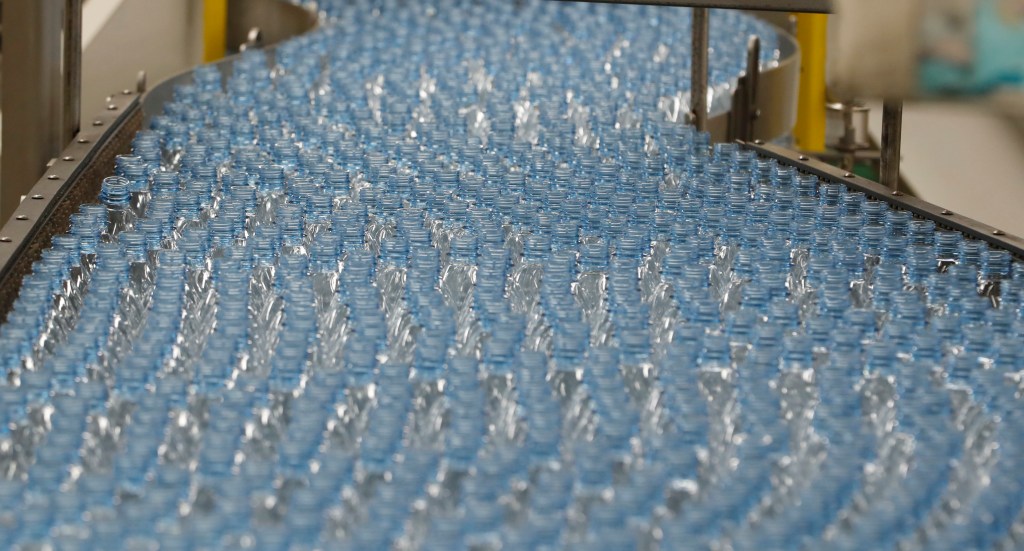Walk any mountain trail, city park, or downtown street this Labor Day weekend and you’ll likely spot plastic bottles or aluminum cans left behind. We call it “litter.” But let’s be honest — this isn’t consumer waste. It’s corporate trash.
For decades, packaging and beverage companies have pulled off one of the most cunning blame-shifts in modern American life. They convinced us that the garbage problem is about our bad habits, our laziness, or our failure to recycle.
Who can remember the famous “Crying Indian” ad from the 1970s? That wasn’t made by environmentalists. It was created and paid for by the beverage and packaging industry. The message was simple: if bottles are floating in creeks or scattered across trails, blame yourself — not the companies churning out billions of single-use containers.
And the ploy worked. For fifty years, we’ve dutifully sorted bottles into blue bins, internalizing guilt, while corporations kept cashing in. The result? They pocket profits, and taxpayers get stuck with the cleanup bill.
At least some institutions are beginning to push back. The University of Colorado recently announced it will eliminate single-use plastic bottles at all home football games and Pepsi has agreed to only sell aluminium and glass products on campus. That’s a small but powerful step–showing leadership while the corporate giants keep dragging their feet
Here’s the uncomfortable truth: recycling alone cannot fix this problem. Fewer than 10% of plastics ever get recycled. Aluminum cans fare better, but even then, U.S. cans contain only about 40% to 50% recycled content. Millions still wind up in Colorado landfills each year — proof that the system is more illusion than solution. It’s like rearranging deck chairs on the Titanic.
Meanwhile, cities like Boulder, Denver, Fort Collins, Pueblo, and Colorado Springs spend millions every year on waste collection and recycling. Who pays? Not Coca-Cola. Not Pepsi. You do — through taxes, garbage fees, and sometimes bottle deposits. We pay once at the store, again when municipalities clean up, and sometimes a third time through bottle deposits.
Imagine allowing a chemical plant to dump sludge in a river and then telling residents to organize Saturday morning cleanups. Absurd? Yes. But that’s exactly how the packaging industry operates — leaving the public to mop up after their mess.
To their credit, Colorado lawmakers recognized this reality in 2022 by passing House Bill 1355, the state’s Producer Responsibility for Recycling Packaging law. Once fully implemented, companies selling packaging and paper products will be required to pay into a statewide system that funds collection and recycling. It’s a forward-thinking step that puts responsibility where it belongs — on the producers, not the public.
But let’s not kid ourselves. Passing the law was the easy part. The real challenge lies ahead: resisting the inevitable push by corporations to water it down. Lobbyists are already circling, looking for loopholes, delays, and exemptions. If Colorado is serious about cleaner trails, reduced landfill waste, and fairer costs for taxpayers, it will need to enforce this law with real teeth.
And remember — fewer than 20% of U.S. states have adopted anything like it. Colorado is ahead of the curve, but national action is lagging badly.
Let’s call the current system what it really is: a subsidy. Every bottle or can that ends up in a landfill represents a hidden taxpayer handout to multinational corporations that choose the cheapest packaging possible and offload the costs onto the public.
Why should Colorado families pay higher waste fees so that beverage giants can shave pennies off production? Why should local governments spend countless hours hauling trash off trails instead of investing in habitat restoration or recreation access?
This is backward economics. The people least responsible for creating the waste are the ones paying the price.
And this issue isn’t only about dollars and cents. Plastics are fossil fuels in disguise — petrochemicals molded into bottles, bags, and straws. Their production fuels greenhouse gas emissions. Their breakdown releases microplastics into rivers, lakes, wildlife, and, yes, even human bloodstreams.
If producers were forced to shoulder cleanup costs, they’d finally have an incentive to use recycled content, eliminate unnecessary packaging, and invest in reusable alternatives. Colorado’s environment would reap the benefits–from the Arkansas and Colorado rivers to alpine lakes in Rocky Mountain National Park.
Industry lobbyists warn that producer-responsibility laws will raise prices. But let’s be clear: consumers already pay. We just do it through hidden taxes, fees, and cleanups. A few pennies more per bottle, openly dedicated to recycling and waste reduction, is far fairer than the billions we silently shell out today.
And if those higher costs spur companies to redesign packaging so it’s reusable or genuinely recyclable? Even better. That’s how a free market is supposed to operate–rewarding innovation while discouraging waste.
Ultimately, this debate is about more than bottles and cans. It’s about what kind of values we want to live by. Do we keep letting corporations profit while offloading cleanup costs onto taxpayers? Or do we demand accountability–aligning responsibility with the mess that’s made?
It’s time to stop blaming the public. Stop subsidizing corporate waste. And start applying the most basic rule every parent teaches their kids:
If you make the mess, you clean it up.
Jim Martin is a former University of Colorado regent. He can be reached at jimmartinesq@gmail.com.
Sign up for Sound Off to get a weekly roundup of our columns, editorials and more.
To send a letter to the editor about this article, submit online or check out our guidelines for how to submit by email or mail.

